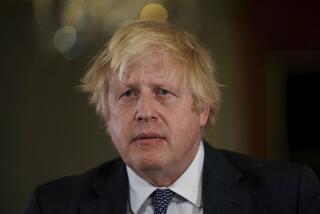Press Secretary and Key Strategist for Blair Resigns
- Share via
LONDON — Alastair Campbell, the director of communications seen as the second-most-powerful man in Prime Minister Tony Blair’s government, resigned Friday after nine years as the strategist who helped Blair shake up Britain’s political culture.
Campbell’s decision was the latest development in a three-month crisis pitting the British news media against the government in a dispute over the justification for going to war in Iraq.
Campbell became a central figure in the dispute when a BBC radio journalist accused him of exaggerating intelligence about Iraq’s arsenal. The ensuing clash escalated after the suicide last month of a Defense Ministry weapons expert whom the government had identified as the BBC’s source for the report.
Ironically, evidence presented this month to a judicial inquiry into the death of the scientist, David Kelly, appears to have undercut the BBC’s accusation against Campbell. But the repercussions nonetheless worsened his reputation as the combative master manipulator of a government obsessed with spin rather than substance.
Blair dismissed that image as a “caricature” Friday.
“The Alastair Campbell I know is an immensely able, fearless, loyal servant of the cause he believes in, who was dedicated not only to that cause but to his country,” Blair said. “He is a strong character who can make enemies, but those who know him best, like him best. His contribution to the Labor Party’s modernization, and electoral success, was enormous.”
Critics welcomed Campbell’s exit and charged that he had functioned as an unofficial deputy prime minister.
“Alastair Campbell’s departure allows the prime minister the opportunity to bring an end to the culture of spin and media manipulation which has so disfigured his government,” said Menzies Campbell of the Liberal Democratic Party. The “resignation should not divert us from the central question of whether Britain went to war on a flawed prospectus.”
Campbell is also a journalist, a veteran of the bare-knuckled tabloid press. He said he had decided months ago to step down in order to spend more time with his family but had agreed to stay on to deal with challenges related to Iraq. Campbell praised Blair’s achievements, citing Britain’s economic progress and its leadership in foreign affairs.
The Kelly case has exemplified the benefits and detriments of the Blair political-media culture. On one hand, the beleaguered government has departed from a tight-lipped official tradition. Blair personally appointed the investigator, Lord Justice Brian Hutton, who has questioned a roster of top officials and disseminated thousands of their secret documents on the court’s Web site.
“It’s healthy, and in the British tradition quite remarkable,” said Michael Cox, a professor of international relations at the London School of Economics. “You don’t expect this in Britain with the secrecy, the old-boy network.”
Public discourse may be more open, but it also can be ferocious and messy. The media and government have developed a mutual distrust, a hair-trigger anger toward each other, analysts say.
Blair’s account also revealed the extent to which awareness of media coverage drove his approach to governing. He recalled the impact of the unscripted morning broadcast May 22 by journalist Andrew Gilligan, who said his source accused Blair’s office of adding dubious information to a public report prepared by intelligence services to make the case against Iraq.
Gilligan alleged that political aides inserted a claim that Iraq could deploy biological and chemical weapons in 45 minutes even though they knew that the information was probably wrong.
In a subsequent newspaper column, Gilligan singled out Campbell as allegedly inserting the 45-minute line against the wishes of spy chiefs.
“We were then in a full and complete storm,” Blair recalled. “This was an attack that went to the heart not just of the office of the prime minister, but also the way our intelligence services operated. It went, in a sense, to the credibility, I felt, of the country.”
The chairman of the BBC’s board of governors sounded similarly dramatic when he blamed Campbell for raking the BBC over the coals during testimony about the broadcast.
“I felt it was an almost unprecedented attack on the BBC to be mounted by the head of communications at 10 Downing Street,” the chairman, Gavyn Davies, testified Thursday. “I took this as an attack on the impartiality of the BBC and the integrity of the BBC.”
Although Campbell’s allies say he has already been vindicated by the inquiry, the intensity of the feud -- and the growing public wariness of politicians -- almost guaranteed he would be a casualty.
“He had more power, I would guess, than anybody else in Downing Street,” said Martin Bell, a former independent legislator. “But it’s a vacuum that has to be filled, and I hope that it’s going to be filled in a way that the government gets out of this spiral of distrust it’s in.”
Blair’s office said Campbell would be replaced by former Labor Party spokesman David Hill.
More to Read
Sign up for Essential California
The most important California stories and recommendations in your inbox every morning.
You may occasionally receive promotional content from the Los Angeles Times.













